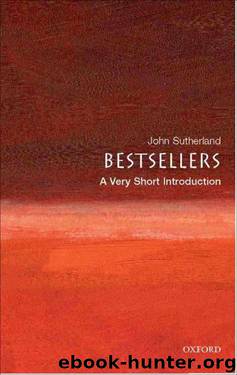Bestsellers: A Very Short Introduction (Very Short Introductions) by Sutherland John

Author:Sutherland, John [Sutherland, John]
Language: eng
Format: epub, mobi
Publisher: Oxford University Press
Published: 2007-10-24T16:00:00+00:00
Postwar
In 1946, Robert Penn Warren (one of the most eminent critics of his time, and a theorist of the Faulknerian ‘Southern School’ of fiction) produced what was, probably, the best ‘literary’ #1 bestseller of the immediate postwar period, All the King’s Men, a roman-á-clef based on the Louisiana demagogue Huey Long. The World War had, it seemed, made America more thoughtful about the ideals its citizens were fighting for.
National conscience was wrenched even more violently by Laura Z. Hobson’s exposure of the discreet mechanisms of anti-Semitism in Gentleman’s Agreement (#1, 1947), filmed the same year, starring Gregory Peck as the journalist Philip Green, who pretends to be Jewish to experience prejudice first hand. The solemnly well-meaning film won three Oscars. But it suggested – with the mass elevation of public education engendered by the postwar GI Bill – that the American bestseller was decades ahead of the American political establishment in terms of civil rights, and could act as an agent of social enlightenment. Could but, in the event, did not. Unhappily, the McCarthyite purge, at the end of the decade, neutered the medium for decades.
There was, oddly, no serious bestseller about World War II, from the serving soldier’s point of view, until Norman Mailer’s The Naked and the Dead (#2, 1948). The ex-rifleman author introduced barrack-room explicitness into American popular fiction – specifically with the profuse scattering throughout his text of the ‘three-letter word’, ‘fug’. It elicited the notable greeting from Dorothy Parker: ‘so you’re the young man who can’t spell fuck.’
Mailer opened a floodgate. In 1951, James Jones’s From Here to Eternity was the year’s #1 bestseller, and Herman Wouk’s The Caine Mutiny was #2. These novels aimed, as Jones put it, ‘to blow the lid off the war’; fugging war, he might have said.
A more ponderous approach to great issues was evident in the saga of the Apostle Peter, The Big Fisherman, by Lloyd C. Douglas, which topped bestseller lists in 1948. Douglas had been a Lutheran minister before becoming a popular novelist and, like Wright and Wallace before him, used bestselling fiction as a God given pulpit for his new congregation of millions. The creation of the state of Israel gave a collateral lift to his popularity. Douglas’s 1942 bestseller, about the most sacred relic of the crucifixion, The Robe, was filmed in the grand Cecil B. DeMille technicolor style in 1953. The film propelled the somewhat antiquated novel into the #1 slot that year, for a second time.
Crime fiction was, in the mid-1940s, even harder-boiled than it had been in trend-setting Black Mask days. The depths of human depravity revealed by the liberation of Germany and the ruthlessness of the War in the Pacific were reflected in the genre. W. R. Burnett’s The Asphalt Jungle (1949) opened with a quotation from William James: ‘man is the most formidable of all beasts of prey, and indeed the only one that preys systematically on his own species.’
The most predatory invention was Mickey Spillane’s series hero, Mike Hammer, introduced in I, the Jury (1947).
Download
Bestsellers: A Very Short Introduction (Very Short Introductions) by Sutherland John.mobi
This site does not store any files on its server. We only index and link to content provided by other sites. Please contact the content providers to delete copyright contents if any and email us, we'll remove relevant links or contents immediately.
| Books & Reading | Comparative Literature |
| Criticism & Theory | Genres & Styles |
| Movements & Periods | Reference |
| Regional & Cultural | Women Authors |
4 3 2 1: A Novel by Paul Auster(12393)
The handmaid's tale by Margaret Atwood(7767)
Giovanni's Room by James Baldwin(7347)
Big Magic: Creative Living Beyond Fear by Elizabeth Gilbert(5775)
Asking the Right Questions: A Guide to Critical Thinking by M. Neil Browne & Stuart M. Keeley(5775)
Ego Is the Enemy by Ryan Holiday(5450)
The Body: A Guide for Occupants by Bill Bryson(5098)
On Writing A Memoir of the Craft by Stephen King(4945)
Ken Follett - World without end by Ken Follett(4734)
Adulting by Kelly Williams Brown(4576)
Bluets by Maggie Nelson(4559)
Eat That Frog! by Brian Tracy(4542)
Guilty Pleasures by Laurell K Hamilton(4450)
The Poetry of Pablo Neruda by Pablo Neruda(4110)
Alive: The Story of the Andes Survivors by Piers Paul Read(4033)
White Noise - A Novel by Don DeLillo(4012)
Fingerprints of the Gods by Graham Hancock(4005)
The Book of Joy by Dalai Lama(3986)
The Bookshop by Penelope Fitzgerald(3854)
